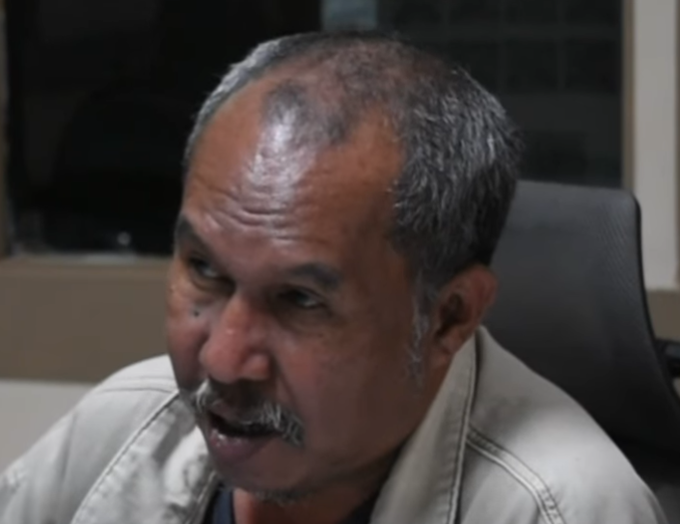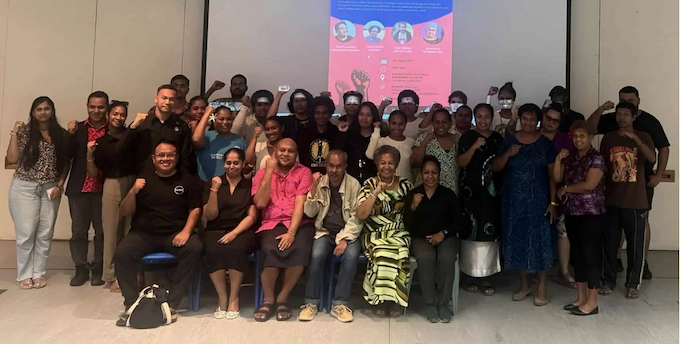
By Andrew Mathieson
Exiled West Papuan media are calling for Fiji — in a reflection of Melanesian solidarity — to hold the greater Pacific region to account and stand against Indonesia’s ongoing media blackout in addition to its human rights abuses.
The leaders in their field which include two Papuans from Indonesia’s occupied provinces have visited the Pacific country to forge media partnerships, university collaboration and joint advocacy for West Papua self-determination.
They were speaking after the screening of a new documentary film, Pepera 1969: A Democratic Integration, was screened at The University of the South Pacific in Fiji.
- READ MORE: Papuan journalist award-winner Victor Mambor targeted for his reports
- West Papua media at Pacific Journalism Review
- Other West Papua media reports
The documentary is based on the controversial plebiscite 56 years ago when 1025 handpicked Papuan electors, which were directly chosen by the Indonesian military out of its 800,000 citizens, were claimed to have voted unanimously in favour of Indonesian control of Western New Guinea.
Victor Mambor — a co-founder of Jubi Media Papua — in West Papua; Yuliana Lantipo, one of its senior journalists and editor; and Dandhy Laksono, a Jakarta-based investigative filmmaker; shared their personal experiences of reporting from inside arguably the most heavily militarised and censored region in the Pacific.
“We are here to build bridges with our brothers and sisters in the Pacific,” Mambor told the USP media audience.
Their story of the Papuan territory comes after Dutch colonialists who had seized Western New Guinea, handed control of the East Indies back to the Indonesians in 1949 before The Netherlands eventually withdrew from Papuan territory in 1963.
‘Fraudulent’ UN vote
The unrepresentative plebiscite which followed a fraudulent United Nations-supervised “Act of Free Choice” in 1969 allowed the Indonesian Parliament to grant its legitimacy to reign sovereignty over the West Papuans.
That Indonesian authority has been heavily questioned and criticised over extinguishing independence movements and possible negotiations between both sides.
Indonesia has silenced Papuan voices in the formerly-named Irian Jaya province through control and restrictions of the media.
Mambor described the continued targeting of his Jubi Media staff, including attacks on its office and vehicles, as part of an escalating crackdown under Indonesia’s current President Prabowo Subianto, who took office less than 12 months ago.
“If you report on deforestation [of West Papua] or our culture, maybe it’s allowed,” he said.
“But if you report on human rights or the [Indonesian] military, there is no tolerance.”
An Indonesian MP, Oleh Soleh, warned publicly this month that the state would push for a “new wave of repression” targeting West Papuan activists while also calling the United Liberation Movement for West Papua (ULMWP) – the West Papuan territory’s peak independence movement – as a “political criminal group”.
‘Don’t just listen to Jakarta’
“Don’t just listen to what Jakarta says,” Mambor said.
“Speak to Papuans, listen to our stories, raise our voices.
“We want to bring West Papua back to the Pacific — not just geographically, but politically, culturally, and emotionally.”
Press freedom in West Papua has become most dire more over the past 25 years, West Papuan journalists have said.
Foreign journalists are barred entry into the territory and internet access for locals is often restricted, especially during periods of civil unrest.
Indigenous reporters also risk arrest and/or violence for filing politically sensitive stories.
Most trusted media
Founded in 2001 by West Papuan civil society, Jubi Media Papua’s English-language publication, the West Papua Daily, has become arguably the most trusted, independent source of news in the territory that has survived over its fearless approach to journalism.
“Our journalists are constantly intimidated,” Mambor said, “yet we continue to report the truth”.
The word Jubi in one of the most popular Indigenous Papuan languages means to speak the truth.
Mambor explained that the West Papua Daily remained a pillar of a vocal media movement to represent the wishes of the West Papuan people.
The stories published are without journalists’ bylines (names on articles) out of fear against retribution from the Indonesian military.
“We created a special section just to tell Pacific stories — to remind our people that we are not alone, and to reconnect West Papua with our Pacific identity,” Mambor said.
Lantipo spoke about the daily trauma faced by the Papuan communities which are caught in between the Indonesian military and the West Papua national liberation army who act on behalf of the ULMWP to defend its ancestral homeland.
‘Reports of killings, displacement’
“Every day, we receive reports: killings, displacement, families fleeing villages, children out of school, no access to healthcare,” Lantipo said.
“Women and children are the most affected.”
The journalists attending the seminar urged the Fijian, Melanesian and Pacific people to push for a greater awareness of the West Papuan conflict and its current situation, and to challenge dominant narratives propagated by the Indonesian government.
Laksono, who is ethnically Indonesian but entrenched in ongoing Papuan independence struggles, has long worked to expose injustices in the region.
“There is no hope from the Asian side,” Laksono said.
“That’s why we are here, to reach out to the Pacific.
“We need new audiences, new support, and new understanding.”
Arrested over tweets
Laksono was once arrested in September 2019 for publishing tweets about the violence from government forces against West Papua pro-independence activists.
Despite the personal risks, the “enemy of the state” remains committed to highlighting the stories of the West Papuan people.
“Much of Indonesia has been indoctrinated through school textbooks and [its] media into believing a false history,” he said.
“Our film tries to change that by offering the truth, especially about the so-called Act of Free Choice in 1969, which was neither free nor a genuine act of self-determination.”
Andrew Mathieson writes for the National Indigenous Times.














































